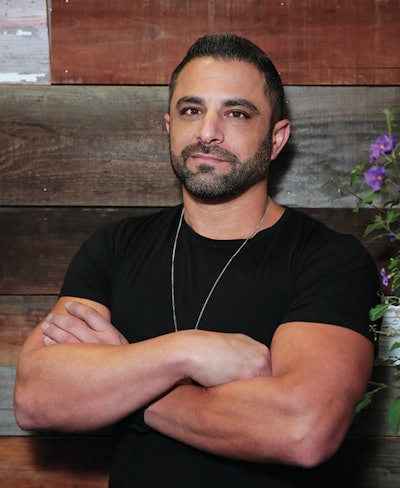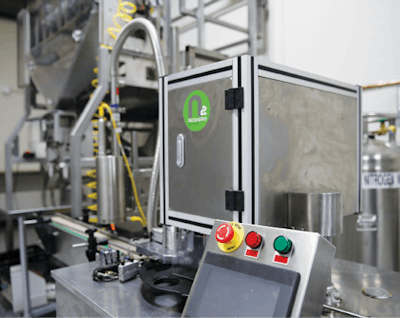

Finding a quiet place to talk is not easy for Brandon Levine.
The whir of construction surrounds the Mercy Wellness CEO and a steady stream of people follow him wherever he goes. “I’m really hands on, so I keep everyone going,” Levine says. He thrives on the energy and activity at his Sonoma County, Calif., dispensary. Located in the heart of Cotati, described as a gateway between the Bay Area and the Emerald Triangle, Mercy Wellness is immersed in an expansion intended to elevate the dispensary experience.
To California cannabis industry veterans, Levine’s backstory may sound familiar. As a teen in his native Sonoma County, he found comfort and opportunity in the local cannabis culture, as well as an alternative to the pills prescribed to treat his attention deficit disorder (ADD). “Unintentionally, [cannabis] was something I found that worked for me,” he explains. His job at one of the area’s oldest head shops yielded him another discovery. “It exposed me to a culture where I felt welcomed,” Levine recalls. “I just kind of felt this is my calling.”
After obtaining his medical marijuana recommendation in 1998, Levine cultivated cannabis in compliance with Proposition 215. He also earned his contractor’s license and enjoyed a successful business until the housing and construction markets crashed in 2008. With a tanking economy and kids to feed, Levine had to act. The time had come to fulfill his destiny. He opened Mercy Wellness in June 2010, and he has been setting increasingly high standards for his dispensary ever since.

Cultivating Community Relations
When Levine sought a home for Mercy Wellness, he had little doubt about where he would look. “I was pretty much born and raised in Sonoma County. Haven’t left and don’t plan on leaving,” he says. In Cotati, he found a city with a healthy attitude toward cannabis business and an ordinance that allowed it. More than eight years after Mercy Wellness first opened, it remains Cotati’s only dispensary. Although, the city is open to adding more as the industry evolves, Levine says.
Levine’s relationship with the city of Cotati is built on transparency and community outreach. He has followed the same blueprint for each of the six licenses he has been approved for to date—three for 10,000-square-foot indoor grows, one for manufacturing, two for distribution and one for the Cotati dispensary—and two for additional Mercy Wellness retail locations planned for nearby Santa Rosa and currently awaiting approval from the municipality.
“We personally go out and meet our neighbors before we even apply for a project,” Levine says. “We do our due diligence, but also do community outreach and make sure it’s in the best interest of the neighborhood and clear up some concerns neighbors might have.” Additionally, Levine provides residents with his personal cellphone and email address, so they can reach him directly with any issues.
The value of Mercy’s strong community and governmental relations became clear at the end of 2017 as adult-use sales in California approached. While neighboring city Rohnert Park shut the door on commercial cannabis sales entirely, Cotati granted Mercy Wellness Sonoma County’s first approval for adult-use sales on Dec. 12, 2017. Though the state’s Jan. 1, 2018, recreational sales start date was only weeks away, Levine and his team were already helping the city prepare for the change.
“Those relationships are very important because you’re part of the community. You want to be a benefit to the community and not a burden to the community. It really does take a bit of education on our part to share with them and show them … that the community is safe with us being here,” Levine explains. “That’s a really big thing that we focus on: security for the community, the customers and our employees.” As proof, Mercy has “rules of conduct” for consumers, which among other behaviors, bans loud music and loitering in the parking lot, and customers can request for an employee to walk them to their cars.
Mercy Wellness also extends an open invitation to local police officers to tour the facility. “We want them to know the ins and outs of the building and for our employees to be familiar faces,” Levine says. “We’re a very open book.”

Expansion Expectations
Cotati’s original cannabis ordinance limited Mercy Wellness to a total of 1,250 square feet, including administrative space. “Bathrooms, office, storage, processing, retail floor, lobby—all of that had to fit,” Levine explains. By the time the dust settled, only a 750-square-foot space was left for retail. Amendments made to the ordinance in 2014 lifted limits on non-retail space, but the ordinance still restricted the size of the dispensary’s retail floor.
When Mercy Wellness requested an increase to 2,000 square feet of retail space for the dispensary’s current expansion, the city’s response surprised Levine. “They ended up allowing for 4,000 square feet of retail space,” he says. “Nobody ever heard of agreeing to give you twice as much as you asked for.”
Since its inception, Levine has worked to transform Mercy Wellness into a dispensary experience unlike any he has known. When the current build-out is complete, Mercy’s retail area will more than triple to 2,300 square feet. Large, 20-by-7-foot interior windows will flank the retail and lobby area, offering behind-the-scenes views into new state-of-the-art extraction and cultivation facilities. The entire retail space is wrapped in Mercy’s signature earthy-industrial chic theme, marrying rich woods and stone with cannabis and high tech.
Levine expects the retail floor and lobby to be in full operation by the time this issue goes to press. Completion of the cultivation and extraction lab should occur within the next six to 12 months.
Product Preservation
Sourcing product has always been both the key to Mercy’s success and its greatest hurdle. “In the beginning, it was a gamble purchasing product. There was no real marketplace. … There was no distribution, there was no warehouse you could call when you run out of a product. There were no branded products,” Levine recalls.
“Things have changed since then. There’s distribution now, and the methods of cultivating have evened it out throughout the whole year,” he adds. “Manufacturers have come in and started manufacturing product all year long, and these brands are all really strong. It’s actually been a really cool thing to watch [happen], because you’re watching the industry be built from the ground up.”
Undeterred by past unpredictability, Levine and his team have built what he believes is one of the state’s most extensive dispensary menus. That’s due in large part to Levine’s decision to package flower in nitrogen-sealed cans, and to establish a packaging company to handle that process for Mercy Wellness and other operators.

“We [were one of] the first ones to take N2 packaging to market in the retail [cannabis] market,” Levine says. Though nitrogen-sealed packaging has been used extensively in the food industry, it’s still relatively new to cannabis. Levine says the process can prolong the shelf life of the product for up to two years. “Normally, you’d have about a two-month window to package your product and sell it before it starts to degrade,” he explains.
The decision to use nitrogen-sealed packaging protects Mercy’s menu from supply fluctuations and allows for broader purchasing. At any given time, the dispensary offers about 70 different cultivars, and “all of them stay very fresh because of the method of packaging,” Levine says.
Mercy also offers an extensive selection of extracts, cartridges, edibles and other products, and Levine says AbsoluteXtracts is Mercy’s top-selling brand. “We’re seeing [cartridges] just grow exponentially in terms of the sales,” he says. “Edibles are also becoming more and more acceptable by people wanting to try them, partly because there is testing. The fear before was you didn’t know what you were getting. … Now you’re able to dose the product and feel good about what you’re taking.”

Elevating Education
When he’s not being hands-on on-site, Levine devotes much time and energy to advancing California’s cannabis industry, with a focus on compliance. In 2016, he helped orchestrate the Elevated Cannabis Compliance Conference, which brought speakers from different agencies together with cannabis operators to share what to expect with regulation looming. Mercy continues to host mixers and educational events with similar goals as needed.
“I sit on multiple boards, one of them being the Cannabis Advisory Group for Sonoma County. Sitting on that board, I do have a seat at the table while we are recommending changes to our local ordinance in the county,” Levine explains. “I also sit on the Sonoma County Growers Alliance board and the California Growers Association board. The whole purpose of me being on those boards is for me to help make changes so that other operators have an opportunity to move into the legal market.”
In advance of California’s second phase of 2018 regulations put into effect July 1, Levine and his Mercy team worked to educate operators on what the state would require for testing, labeling and language on cannabis products. “I would say that 90 percent of the operators, at least, had a really hard time with that, and we saw products just fall off our shelf,” Levine says. “We lost at least 90 percent of our product lines that we had on our shelves pre-July 1.”
Though ongoing changes in state regulations affected supply, Mercy Wellness came through fine. “Through that process of just educating [operators], we were able to create really good relationships and we maintained a pretty good stock of inventory moving into that six months and continued to grow our inventory after that,” Levine says.

Maintaining Meaning
As the sole owner of Mercy Wellness, Levine has taken what many might consider unconventional approaches: He established a separate management company that includes an in-house tax attorney, a finance department, in-house marketing, human resources, multiple project managers and a compliance department. He’s managed to stay 100-percent self-funded, though growth hasn’t been easy. He’s often restricted by how much capital Mercy has, as funds are not unlimited. He’s also survived a 280E audit of the dispensary’s first three years and came through relatively unscathed.
Looking ahead, he sees industry growth: “I see [the industry] becoming really commercialized, and it’s hard to keep up with because you have a lot of moving parts here. But it’s only going to keep growing. The cannabis industry is at the point where it’s not stoppable.”
He believes appellations will play important roles for California craft cultivators—on an international stage—and alliances with vintners and Sonoma wine tourism will hold significance closer to home. You might expect Mercy’s future plans to involve far-reaching market domination, and they may, but it seems something more heartfelt holds true.
With an apparent nod to his early industry exposure, Levine hopes Mercy remains focused on people, community and culture. “The one thing that I’ve always been really big on is the culture of my business—to try and remain the same and continue that culture that we’ve had and not become this big corporate monster,” Levine says. “We have a community here and we want to maintain that same culture. If anything, that’s the one thing we really want to stand for—making sure that it’s a comfortable place for people to come to, that it’s a comfortable place for people to work. For the longest time my employees knew almost every single person that came through here by first and last name. We want to continue to have that relationship with the people that are coming in here.”


























